6 books about Mauss, Marcel
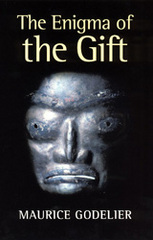
The Enigma of the Gift
Maurice Godelier
University of Chicago Press, 1998
When we think of giving gifts, we think of exchanging objects that carry with them economic or symbolic value. But is every valuable thing a potentially exchangeable item, whose value can be transferred? In The Enigma of the Gift, the distinguished French anthropologist Maurice Godelier reassesses the significance of gifts in social life by focusing on sacred objects, which are never exchanged despite the value they possess.
Beginning with an analysis of the seminal work of Marcel Mauss and Claude Lévi-Strass, and drawing on his own fieldwork in Melanesia, Godelier argues that traditional theories are flawed because they consider only exchangeable gifts. By explaining gift-giving in terms of sacred objects and the authoritative conferral of power associated with them, Godelier challenges both recent and traditional theories of gift-giving, provocatively refreshing a traditional debate.
Elegantly translated by Nora Scott, The Enigma of the Gift is at once a major theoretical contribution and an essential guide to the history of the theory of the gift.
Beginning with an analysis of the seminal work of Marcel Mauss and Claude Lévi-Strass, and drawing on his own fieldwork in Melanesia, Godelier argues that traditional theories are flawed because they consider only exchangeable gifts. By explaining gift-giving in terms of sacred objects and the authoritative conferral of power associated with them, Godelier challenges both recent and traditional theories of gift-giving, provocatively refreshing a traditional debate.
Elegantly translated by Nora Scott, The Enigma of the Gift is at once a major theoretical contribution and an essential guide to the history of the theory of the gift.
[more]
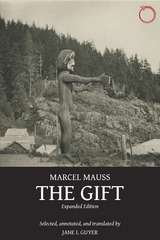
The Gift
Expanded Edition
Marcel Mauss
HAU, 2016
Scan down a list of essential works in any introduction to anthropology course and you are likely to see Marcel Mauss’ masterpiece, The Gift. With this new translation, Mauss’ classic essay is returned to its original context, published alongside the works that framed its first publication in the 1923–24 issue of L’Année Sociologique. With a critical foreword by Bill Maurer and a new introduction by translator Jane Guyer, this expanded edition is certain to become the standard English version of the essay—a gift that keeps on giving.
Included alongside the “Essay on the Gift” are Mauss’ memorial accounts of the work of Émile Durkheim and his colleagues who were lost during World War I, as well as his scholarly reviews of influential contemporaries such as Franz Boas, J. G. Frazer, Bronislaw Malinowski, and others. Read in the context of these additional pieces, the “Essay on the Gift” is revealed as a complementary whole, a gesture of both personal and political generosity: Mauss’ honor for his fallen colleagues; his aspiration for modern society’s recuperation of the gift as a mode of repair; and his own careful, yet critical, reading of his intellectual milieu. The result sets the scene for a whole new generation of readers to study this essay alongside pieces that exhibit the erudition, political commitment, and generous collegial exchange that first nourished the essay into life.
Included alongside the “Essay on the Gift” are Mauss’ memorial accounts of the work of Émile Durkheim and his colleagues who were lost during World War I, as well as his scholarly reviews of influential contemporaries such as Franz Boas, J. G. Frazer, Bronislaw Malinowski, and others. Read in the context of these additional pieces, the “Essay on the Gift” is revealed as a complementary whole, a gesture of both personal and political generosity: Mauss’ honor for his fallen colleagues; his aspiration for modern society’s recuperation of the gift as a mode of repair; and his own careful, yet critical, reading of his intellectual milieu. The result sets the scene for a whole new generation of readers to study this essay alongside pieces that exhibit the erudition, political commitment, and generous collegial exchange that first nourished the essay into life.
[more]
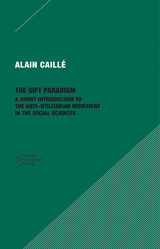
The Gift Paradigm
A Short Introduction to the Anti-Utilitarian Movement in the Social Sciences
Alain Caillé
Prickly Paradigm Press, 2020
In his classic essay The Gift, Marcel Mauss argued that gifts can never be truly free; rather, they bring about an expectation of reciprocal exchange. For over one hundred years, his ideas on economy, social relations, and exchange have inspired new modes of thought, none more so than what crystallized in the 1980s around an innovative group of French academics. In TheGift Paradigm, Alain Caillé provides the first in-depth, English-language introduction to La Revue du MAUSS—or, “Anti-Utilitarian Movement in the Social Sciences,” combining the work of anthropologists, sociologists, philosophers, and others. Today, the very idea of a “general social science” seems unthinkable, unless you count the pervasive sway of a utilitarian logic in orthodox economics, or the diffuse influence of neoliberalism. Here, Caillé offers a distinctly different reading of economy and society, inspired by Mauss—as vital now as ever.
[more]
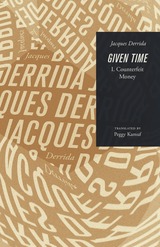
Given Time
I. Counterfeit Money
Jacques Derrida
University of Chicago Press, 1992
Is giving possible? Is it possible to give without immediately entering into a circle of exchange that turns the gift into a debt to be returned? This question leads Jacques Derrida to make out an irresolvable paradox at what seems the most fundamental level of the gift's meaning: for the gift to be received as a gift, it must not appear as such, since its mere appearance as gift puts it in the cycle of repayment and debt.
Derrida reads the relation of time to gift through a number of texts: Heidegger's Time and Being, Mauss's The Gift, as well as essays by Benveniste and Levi-Strauss that assume Mauss's legacy. It is, however, a short tale by Baudelaire, "Counterfeit Money," that guides Derrida's analyses throughout. At stake in his reading of the tale, to which the second half of this book is devoted, are the conditions of gift and forgiveness as essentially bound up with the movement of dissemination, a concept that Derrida has been working out for many years.
For both readers of Baudelaire and students of literary theory, this work will prove indispensable.
Derrida reads the relation of time to gift through a number of texts: Heidegger's Time and Being, Mauss's The Gift, as well as essays by Benveniste and Levi-Strauss that assume Mauss's legacy. It is, however, a short tale by Baudelaire, "Counterfeit Money," that guides Derrida's analyses throughout. At stake in his reading of the tale, to which the second half of this book is devoted, are the conditions of gift and forgiveness as essentially bound up with the movement of dissemination, a concept that Derrida has been working out for many years.
For both readers of Baudelaire and students of literary theory, this work will prove indispensable.
[more]
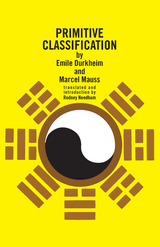
Primitive Classification
Emile Durkheim and Marcel Mauss
University of Chicago Press, 1967
Emile Durkheim and Marcel Mauss maintain that society is the source of the very categories of human thought. First published in the Année Sociologique in 1903, this classic essay has been translated by Rodney Needham, who also provides a critical introduction.
"[Primitive Classification] will impress the reader with its quiet elegance, its direct, logical form, its clarity of style, its spirit of careful, yet bold, exploration."—Harry Alpert, American Journal of Sociology
"Particularly instructive for anyone who wonders what social anthropology is: how, if at all, it differs from sociology and whether it has any unifying theoretical problem."—F. K. Lehman, American Sociological Review
"[Primitive Classification] will impress the reader with its quiet elegance, its direct, logical form, its clarity of style, its spirit of careful, yet bold, exploration."—Harry Alpert, American Journal of Sociology
"Particularly instructive for anyone who wonders what social anthropology is: how, if at all, it differs from sociology and whether it has any unifying theoretical problem."—F. K. Lehman, American Sociological Review
[more]
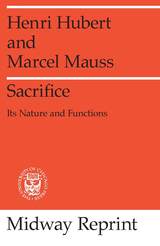
Sacrifice
Its Nature and Functions
Henri Hubert and Marcel Mauss
University of Chicago Press, 1981
Marcel Mauss was the nephew and most distinguished pupil of Émile Durkheim, whose review L'Année sociologique he helped to found and edit. Henri Hubert was another member of the group of sociologists who developed under the influence of Durkheim.
The present book is one of the best-known essays pulbished in L'Année sociologique and has been regarded as a model for method and mode of interpretation. Its subject is at the very center of the comparative study of religion. The authors describe a basic sacrifice drawn from Indian sources and show what is fundamental and constant, comparing Indian and Hebrew practices in particular, then Greek and Roman, then additional practices from many eras and cultures.
The present book is one of the best-known essays pulbished in L'Année sociologique and has been regarded as a model for method and mode of interpretation. Its subject is at the very center of the comparative study of religion. The authors describe a basic sacrifice drawn from Indian sources and show what is fundamental and constant, comparing Indian and Hebrew practices in particular, then Greek and Roman, then additional practices from many eras and cultures.
[more]
READERS
Browse our collection.
PUBLISHERS
See BiblioVault's publisher services.
STUDENT SERVICES
Files for college accessibility offices.
UChicago Accessibility Resources
home | accessibility | search | about | contact us
BiblioVault ® 2001 - 2024
The University of Chicago Press









